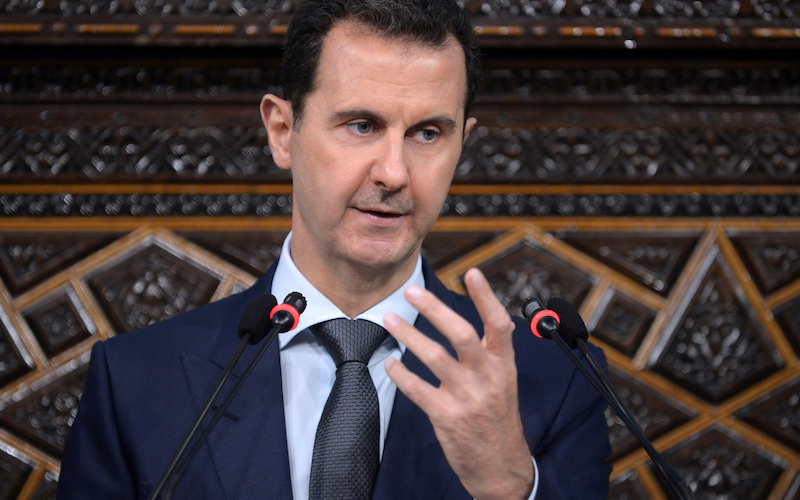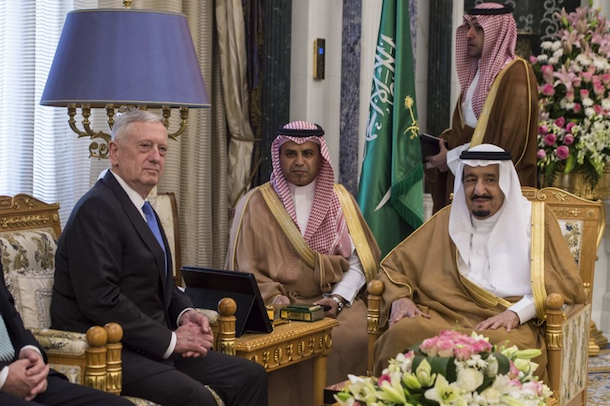
GCC Hopes for More from Trump on Syria
President Donald Trump’s decision to fire 59 Tomahawk cruise missiles at the Syrian military’s airfield in Shayrat on April 7 received much praise from Washington’s key Western and Middle Eastern allies. All Gulf Cooperation Council (GCC) members, with the unsurprising exception of Oman, officially endorsed the limited and targeted strike as righteous and strategically sound. By abandoning the Obama administration’s cautious and restrictive approach, and responding directly to the Damascus regime with force, Trump’s decision signaled that the US may embrace a new course of action in Syria that would receive strong approval from Riyadh and other GCC capitals.
The strike sent Washington’s Arab Gulf allies a clear message. Unlike his predecessor, whose administration supported elements of the armed opposition yet ordered no intentional military strikes on the Syrian Arab Army (SAA), Trump is evidently willing to enforce “red lines” with Damascus. The shift comes as a major assurance to the Arab Gulf states, chiefly Saudi Arabia and Qatar, which have invested billions of dollars into Sunni rebels fighting to overthrow Bashar al-Assad since 2011 and strongly support the US military taking on a greater role in the raging civil war and asserting itself against Tehran’s strategic gains in the Levant.
Last year, with anger and alarm GCC officials watched developments unfold in Syria. In December, the SAA, with substantial international and regional support, reasserted its authority over eastern Aleppo. The victory secured the regime’s control over the country’s most populous city and economic heart of pre-2011 Syria, in addition to its other highly populated areas (Damascus, Hama, Homs, and Latakia), placing Assad in his strongest position since the civil war erupted and GCC-backed rebels in their weakest.
Until April 7, there were expectations that Trump would leave Assad alone and perhaps view the Syrian president as a tacit ally in Washington’s struggle against ISIS. It was only late last month when US Secretary of State Rex Tillerson stated that Assad’s status was to be “decided by the Syrian people” and US Ambassador to the UN Nikki Haley declared that “our priority is no longer to sit and focus on getting Assad out.”
A One-Off?
In truth, the strike was largely symbolic and did effectively nothing to alter the balance of power in Syria, as underscored by the regime’s forces operating from the base within 24 hours of the dust settling. US officials notified their Russian counterparts, who warned the Syrian regime, giving its forces enough time to evacuate the base, in advance, ensuring minimal loss of life as a consequence of the operation.
To the GCC, what matters most now is how the Trump administration follows up in Syria. Many in the Council wonder if the April 7 strike was a one-off operation or the beginning of a US campaign to overthrow or severely weaken the Damascus regime. Whereas the Saudis desperately want Assad ousted at some near-term juncture, it is not clear that the Trump administration shares this goal. Unquestionably, the US could shift the balance of power in Syria. Yet given the risks of what a post-Assad Syria may look like in the eyes of Trump’s anti-Islamist inner circle, it is not clear that the administration would support such actions.

Saudi Arabia, bogged down in Yemen, is in absolutely no position to take out Assad through any unilateral military action. For Riyadh to achieve its goals in Syria, US support and heavy lifting are necessary. To be sure, the April 7 strike provided no guarantee that Washington has the intention of toppling the Syrian regime. The president’s domestic objectives, chiefly undermining the narrative that Trump is a Russian “puppet” and distinguishing his administration from Obama’s, were arguably Trump’s main motivators. In Eric Trump’s words, “If there was anything that Syria did, it was to validate the fact that there is no Russia tie.”
So what if Trump’s strike achieved his domestic objectives and he chooses to not follow up with more military action against Syrian regime infrastructure? One consequence will be him not pleasing those in the Gulf, who are counting on the US to take out Assad or at least alter the balance of power in Syria. While GCC states welcome the reversal in the Trump administration’s rhetoric on Assad’s future, doubt lingers as to what extent Washington will go to more aggressively punish Damascus.
Geopolitical Concerns for the GCC
Given how the Arab Gulf states are seeking better ties with Russia while attempting to create distance between Moscow and Tehran, such US military action against the Syrian regime appears to have the opposite effect. The Russian, Iranian, and Syrian foreign ministers held a trilateral meeting in Moscow on April 14 and condemned Trump’s strike on Syria with Russian foreign minister Sergey Lavrov warning of “grave consequences not only for regional and global security” for similar US attacks in the future.
The prospects for growing US-Russia cooperation in the struggle against terrorism in Syria have dimmed as a result of the April 7 strike. Russia may well begin acting more unilaterally in pursuit of its interests inside Syria while distancing itself from the US and other Western powers. Currently, Iran is the only foreign country directly intervening so heavily in Syria which shares the Kremlin’s objective of strengthening the Damascus regime. Naturally, the value that Russia places on its cooperation with Tehran in Syria could only increase as a consequence of Moscow’s growing tension with the White House.
From Iran’s vantagepoint, there has always been a risk that Russia would “sell out” Iran in favor of improved ties with Washington, a concern that heightened following Trump’s win given his campaign’s focus on better relations with Moscow. Yet the tension resulting from the US strike on Syria gives Tehran assurance that no improvement in US-Russia relations is realistic anytime soon, providing Iran much more confidence.
The Ball’s in Trump’s Court
Ultimately, much confusion persists throughout the region. With an unpredictable foreign policy that routinely contradicts itself, Trump is leaving friends and foes highly uncertain about how the US sees itself, its interests, and its purpose in the ravaged Middle East. That said, only three months into his presidency, Trump has successfully provided the GCC with a greater sense of confidence in Washington’s plans to counter Iran. The State Department’s decision to end the previous administration’s freeze on a sale of 19 F-16 fighter jets to Bahrain and the new administration’s consideration of stepping up US support for the Saudi-led military campaign in Yemen fuel this cautious optimism in the GCC.
Hopeful that Trump will come around to seeing Syria through their lens and view the Assad regime’s survival as incompatible with any resolution to the civil war, officials in Riyadh and other GCC capitals expect more from Trump in Syria. Whether such hope will last depends on how the 45th American president will approach Assad’s regime moving forward.
